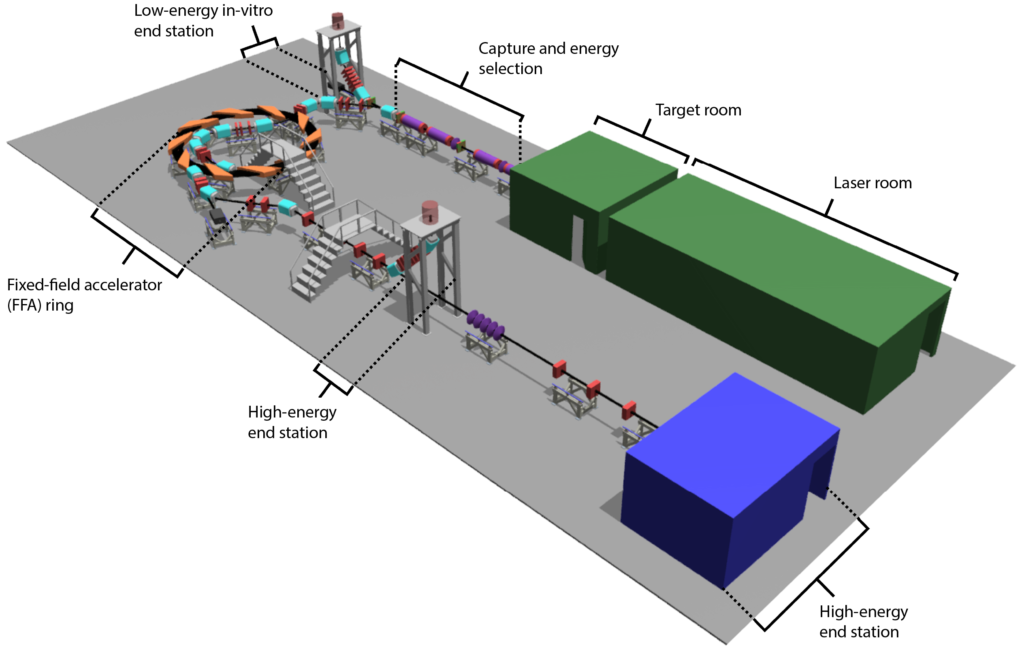The UK has driven important advances in cancer therapy and treats many patients successfully with radiotherapy, using both X-rays and protons. However, some tumours remain difficult to treat.
Scientists believe that heavier particles, such as helium and carbon ions may offer therapeutic advantages in these situations, but further investigation is needed.
UK Research and Innovation (UKRI) is investing £2 million to kick-start research on the next generation of radiotherapy treatments for cancer. The project, organised through the Science and Technology Facilities Council’s (STFC) Daresbury Laboratory, at Sci-Tech Daresbury, will support the establishment of the Ion Therapy Research Facility (ITRF). The study will enable the design and planning for the ITRF to create a world leading UK radiobiology research facility, through which UK and international partners will pursue next generation treatments. The Cockcroft Institute (CI) is playing a number of key roles in this exciting project.
ITRF brings together the UK’s vibrant research base that has developed many advances in particle accelerators, used in applications ranging from traditional ‘big science’ to medical science.

Dr Hywel Owen, project scientist on ITRF and member of the Cockcroft Institute, said: “In the UK around half of all people will be diagnosed with cancer in their lifetime, and radiotherapy is crucial for the successful treatment of nearly half of those patients. Existing particle accelerator technology has helped our clinical colleagues to give the UK great advances in cancer survival, but we can do more. Our partnership takes the UK’s world-leading accelerator science and will apply it to enabling new paradigms for future treatments. Thanks to UKRI funding, this truly multidisciplinary project will help us deliver the basic research into ion radiobiology that will enable future methods of ion radiotherapy.”
It will exploit the UK’s advanced expertise in developing new laser technologies for medical applications, and specifically that of a UK-led collaboration, Laser hybrid Accelerator for Radiobiological Applications (LhARA).
Harnessing unique acceleration techniques developed by LhARA, it will deliver intense ion beams with properties unattainable at any existing ion-therapy facility in the world today.
Developing these new technologies will mean that LhARA can provide more types of ions with greater control over how they are used for treatment than is possible with current radiotherapy facilities, and do this at a lower cost.
Proton therapy targets cancers very precisely, increasing success rates and reducing side-effects. This makes it the ideal treatment for children whose organs are still growing, or solid tumours close to sensitive tissues.
LhARA will allow investigations into the use of carbon and other ions which can be even more effective at killing cancer cells than protons for some treatments.
Professor Ken Long from Imperial College, who is leading the LhARA programme, said: “It is great news that we have got funding to start up LhARA. In the next two years we will start tests of the laser source concept and investigate plasma lenses for steering particle beams, two key technologies we must develop for the project.”
The development of the laser-driven source will see the direct involvement of Cockcroft Institute scientists at Lancaster University and the University of Strathclyde, who will perform a detailed series of numerical tests and experiments, with the ion acceleration beamline at SCAPA, to optimise the generation of protons and heavier ions.
Plasma lenses will be used to capture and perform energy selection of the laser-generated ions, and Manchester University CI scientists will be involved in the design of a plasma lens test stand for ITRF. The capture ions will be guided using beam monitoring systems that are being developed at CI partner Liverpool University, in the Physics Department.
An important part of the LhARA programme is the development of new treatment monitoring techniques. The intense ion pulses will generate acoustic signals that can be monitored during radiotherapy treatment, and a new ionacoustic method will be developed to allow better treatment optimsation This cutting-edge R&D will be carried out at the CI within the University of Liverpool’s QUASAR Group, led by Professor Carsten P Welsch.
Delivering the next generation of treatments will require study of different delivery methods to the patient. This will be explored through innovative experimental end station designs for radiobiology, where the extensive experience of CI partner Manchester University will be brought to bear. Working closely with The Christie NHS Foundation Trust and the Clatterbridge Cancer Centre, the ITRF will develop an end-station design and the delivery beamlines to it, also using theUK’s partnership with CERN to build on CERN’s extensive experience in medical applications.
Professor Karen Kirkby, lead scientist at the proton therapy research programme across The University of Manchester and The Christie NHS Foundation Trust, said: “This project builds on an initiative funded by UKRI which helped forge the vision and roadmap for the ITRF. It is a brilliant opportunity to bring together a truly multidisciplinary community to work with accelerator scientists to develop an ITRF for the UK academic, clinical and research communities. It will form a pipeline to the clinic, enabling us to target tumours that are currently very difficult to treat.”
